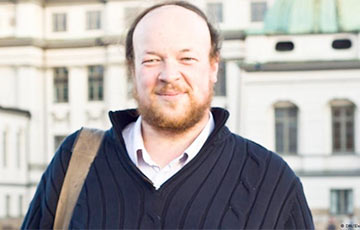Belarus and Lithuania Experienced the Soviet Period in Different Ways, Historian Says
1- 15.07.2016, 12:43
- 7,153

Photo: Deutsche Welle
The Soviet period in many ways affected the national identity of the Belarusians and the Lithuanians.
Historian and representative of the European Research Centre Aliaksei Bratachkin told in the interview to charter97.org. He participated in the historian debates on history of Belarus and Lithuania, as well as on problems of the Belarusian identity and how to present the history.
The discussion was held within the meeting of Belarusians from all over the world last week in Vilnius.
- What can the place of the meeting show? Why it is held not in Minsk or Homel, for instance?
- In fact, it expresses volumes. On the one hand it is determined by the political situation; it is much easier to hold such events outside Belarus, if we want to have a plural, diverse composition of guests and to discuss some things freely. On the other hand, I believe that it is very good that it is held outside Belarus because you can better understand yourself in a different environment. And a comparison of the Belarusian and Lithuanian identity is something that makes questions to yourself and others arise.
- What kind of questions?
- In fact, the years after the collapse of the USSR have proved that despite the conventionally common history, at least the period of the Soviet Union, people within countries experienced the Soviet times in different ways and now treat it differently. At the same time it is about the dispute about the historical heritage of the Grand Duchy of Lithuania. It is about how historians try to overcome local boundaries. There is a dialogue between Belarusian and Lithuanian historians. It has taken a long time and such discussion is not the last example. This is an interesting example of cooperation across borders, because Lithuanian historians arrived in Belarus. So it's a mutual exchange. Not everything happens in Lithuania. Something happens with the participation of Lithuanians in Belarus.
- Does the GDL's or Soviet narrative prevail in a mass public mind?
- In principle, since the late 1980s and the early 1990s due to national revival we had, the activity of the Belarusian Popular Front and a number of historians, changes in historiography the reference to the GDL has become a fundamental and has not been disputed. In this sense, one can say that the GDL is already a part of history if we are talking about the official historiography. The soviet period is not the only reference point. Olgerd monument in Vitsebsk is one of examples. It means some progress in acceptance of such different versions of the history (although the government does not accept all interpretations in the history of the GDL).
Some researchers in Belarus say that there was a split of memory of culture in the 1990s. New holidays emerged. The official politics of memory offered one version of the history and there were alternative ones. Now, it seems to me, if it is not convergence, then at least parallel trajectories align.
- If you talk about communication across borders. Lithuania keeps in contact with the official Minsk, but it also supports the opposition and the civil society. How strong are these ties?
- There is a great number of examples of Belarus-Lithuania cooperation particularly as regards work with the civil society of Belarus. I mean not only this meeting, but the Congress of Researchers of Belarus will be held in Kaunas this autumn with support of the Lithuanian Foreign Ministry. This is one example of the cooperation. Lithuanians have many things done in Belarus, for example, they perform Lithuanian culture at exhibitions or various conferences are organized in the territory of the embassy in Minsk.










